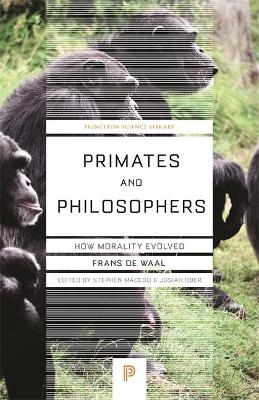
Primates and Philosophers
Princeton University Press (Verlag)
978-0-691-16916-3 (ISBN)
Drawing on Darwin, recent scientific advances, and his extensive research of primate behavior, de Waal demonstrates a strong continuity between human and animal behavior. He probes issues such as anthropomorphism and human responsibilities toward animals. His compelling account of how human morality evolved out of mammalian society will fascinate anyone who has ever wondered about the origins and reach of human goodness. Based on the Tanner Lectures de Waal delivered at Princeton University's Center for Human Values in 2004, Primates and Philosophers includes responses by the philosophers Peter Singer, Christine M. Korsgaard, and Philip Kitcher and the science writer Robert Wright. They press de Waal to clarify the differences between humans and other animals, yielding a lively debate that will fascinate all those who wonder about the origins and reach of human goodness.
Frans de Waal is the C. H. Candler Professor of Psychology at Emory University and director of the Living Links Center at the Yerkes National Primate Center in Atlanta.
Acknowledgments vii Introduction by Josiah Ober and Stephen Macedo ix PART I: Morally Evolved: Primate Social Instincts,Human Morality, and the Rise and Fall of "Veneer Theory" by Frans de Waal 1 Appendix A: Anthropomorphism and Anthropodenial 59 Appendix B: Do Apes Have a Theory of Mind? 69 Appendix C: Animal Rights 75 PART II: Comments: The Uses of Anthropomorphism by Robert Wright 83 Morality and the Distinctiveness of Human Action by Christine M. Korsgaard 98 Ethics and Evolution: How to Get Here from There by Philip Kitcher 120 Morality, Reason, and the Rights of Animals by Peter Singer 140 PART III: Response to Commentators: The Tower of Morality by Frans de Waal 161 References 183 Contributors 197 Index 201
| Erscheinungsdatum | 24.03.2016 |
|---|---|
| Reihe/Serie | Princeton Science Library |
| Zusatzinfo | 9 halftones. 3 tables. |
| Verlagsort | New Jersey |
| Sprache | englisch |
| Maße | 140 x 216 mm |
| Gewicht | 227 g |
| Themenwelt | Sachbuch/Ratgeber ► Natur / Technik |
| Naturwissenschaften ► Biologie ► Evolution | |
| Naturwissenschaften ► Biologie ► Humanbiologie | |
| ISBN-10 | 0-691-16916-0 / 0691169160 |
| ISBN-13 | 978-0-691-16916-3 / 9780691169163 |
| Zustand | Neuware |
| Haben Sie eine Frage zum Produkt? |
aus dem Bereich


